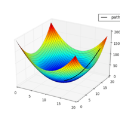Our society is increasingly fond of computational tools. This phenomenon has greatly increased over the past decade following, among other factors, the emergence of a new Artificial Intelligence paradigm. Specifically, the coupling of two algorithmic techniques, Deep Neural Networks and Stochastic Gradient Descent, thrusted by an exponentially increasing computing capacity, has and is continuing to become a major asset in many modern technologies. However, as progress takes its course, some still wonder whether other methods could similarly or even more greatly benefit from these various hardware advances. In order to further this study, we delve in this thesis into Evolutionary Algorithms and their application to Dynamic Neural Networks, two techniques which despite enjoying many advantageous properties have yet to find their niche in contemporary Artificial Intelligence. We find that by elaborating new methods while exploiting strong computational resources, it becomes possible to develop strongly performing agents on a variety of benchmarks but also some other agents behaving very similarly to human subjects on the video game Shinobi III : Return of The Ninja Master, typical complex tasks previously out of reach for non-gradient-based optimization.
翻译:翻译后标题:
进化人工神经网络模仿《忍者神龟3:忍者大师归来》中的人类行为
翻译后摘要:
我们的社会越来越喜欢使用计算工具。在过去的十年中,这一现象在其他因素的推动下,特别是新的人工智能范例的出现,有了很大的增长。具体来说,两种算法技术的耦合,深度神经网络和随机梯度下降,受到计算能力的指数增长的推动,已经成为许多现代技术的重要资产。然而,随着进展的发展,一些人仍然想知道其他方法是否同样或甚至更大程度地从这些各种硬件进步中受益。为了进一步研究这一问题,我们在本文中深入探讨进化算法及其在动态神经网络方面的应用,这两种技术尽管具有许多优点性质,但仍未在当代人工智能中找到它们的适用领域。我们发现,通过制定新的方法并利用强大的计算资源,可以开发在各种基准测试中性能强大的代理,同时还可以开发出在《忍者神龟3:忍者大师归来》这种典型的复杂任务上非梯度优化的代理,这些代理表现出与人类受试者非常相似的行为。


